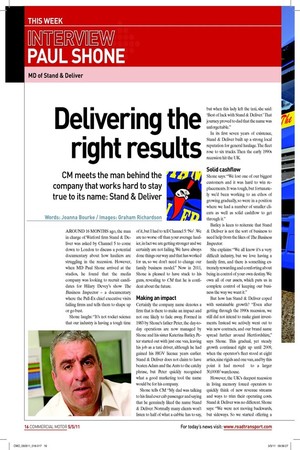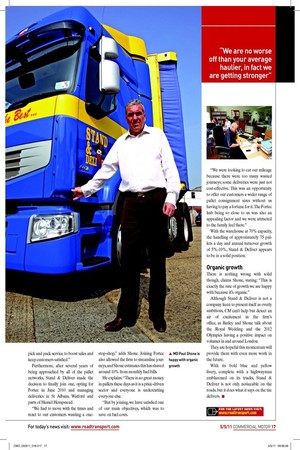Delivering the right results
Page 14

Page 15

If you've noticed an error in this article please click here to report it so we can fix it.
CM meets the man behind the company that works hard to stay true to its name: Stand & DeLiver
Words: Joanna Bourke / Images: Graham Richardson
AROUND 16 MONTHS ago, the man in charge of Watford irm Stand & Deliver was asked by Channel 5 to come down to London to discuss a potential documentary about how hauliers are struggling in the recession. However, when MD Paul Shone arrived at the studios, he found that the media company was looking to recruit candidates for Hilary Devey’s show The Business Inspector – a documentary where the Pall-Ex chief executive visits failing irms and tells them to shape up or go bust.
Shone laughs: “It’s not rocket science that our industry is having a tough time of it, but I had to tell Channel 5: ‘No’ . We are no worse off than your average haulier, in fact we are getting stronger and we certainly are not failing. We have always done things our way and that has worked for us, so we don’t need to change our family business model.” Now in 2011, Shone is pleased to have stuck to his guns, revealing to CM that he is conident about the future.
Making an impact
Certainly the company name denotes a irm that is there to make an impact and not one likely to fade away. Formed in 1983 by Shone’s father Peter, the day-today operations are now managed by Shone and his sister Katerina Batley. Peter started out with just one van, leaving his job as a taxi driver, although he had gained his HGV licence years earlier. Stand & Deliver does not claim to have beaten Adam and the Ants to the catchy phrase, but Peter quickly recognised what a good marketing tool the name would be for his company.
Shone tells CM: “My dad was talking to his inal ever cab passenger and saying that he genuinely liked the name Stand & Deliver. Normally many clients won’t listen to half of what a cabbie has to say, but when this lady left the taxi, she said: ‘Best of luck with Stand & Deliver.’ That journey proved to dad that the name was unforgettable.” In its irst seven years of existence, Stand & Deliver built up a strong local reputation for general haulage. The leet rose to six trucks. Then the early 1990s recession hit the UK.
Solid cashflow
Shone says: “We lost one of our biggest customers and it was hard to win replacements. It was tough, but fortunately we’d been working to an ethos of growing gradually, so were in a position where we had a number of smaller clients as well as solid cashlow to get through it.” Batley is keen to reiterate that Stand & Deliver is not the sort of business to need help from the likes of The Business Inspector.
She explains: “We all know it’s a very dificult industry, but we love having a family irm, and there is something extremely rewarding and comforting about being in control of your own destiny. We own all of our assets, which puts us in complete control of keeping our business the way we want it.”
But how has Stand & Deliver coped with sustainable growth? “Even after getting through the 1990s recession, we still did not intend to make giant investments. Instead we actively went out to win new contracts, and our brand name spread further around Hertfordshire,” says Shone. This gradual, yet steady growth continued right up until 2009, when the operator’s leet stood at eight artics, nine rigids and one van, and by this point it had moved to a larger 30,000ft2 warehouse.
However, the UK’s deepest recession in living memory forced operators to quickly think of new revenue streams and ways to trim their operating costs. Stand & Deliver was no different. Shone says: “We were not moving backwards, but sideways. So we started offering a pick and pack service to boost sales and keep customers satisied.” Furthermore, after several years of being approached by all of the pallet networks, Stand & Deliver made the decision to inally join one, opting for Fortec in June 2010 and managing deliveries in St Albans, Watford and parts of Hemel Hempstead.
“We had to move with the times and react to our customers wanting a one
stop-shop,” adds Shone. Joining Fortec also allowed the irm to streamline journeys, and Shone estimates this has shaved around 10% from monthly fuel bills.
He explains: “There is no great money in pallets these days as it is a price-driven sector and everyone is undercutting everyone else.
“But by joining, we have satisied one of our main objectives, which was to save on fuel costs. “We were looking to cut our mileage because there were too many wasted journeys; some deliveries were just not cost-effective. This was an opportunity to offer our customers a wider range of pallet consignment sizes without us having to pay a fortune for it. The Fortec hub being so close to us was also an appealing factor and we were attracted to the family feel there.” With the warehouse at 70% capacity, the handling of approximately 75 pallets a day and annual turnover growth of 5%-10%, Stand & Deliver appears to be in a solid position.
Organic growth
There is nothing wrong with solid though, claims Shone, stating: “This is exactly the rate of growth we are happy with because it’s organic.” Although Stand & Deliver is not a company keen to present itself as overly ambitious, CM can’t help but detect an air of excitement in the irm’s ofice, as Batley and Shone talk about the Royal Wedding and the 2012 Olympics having a positive impact on volumes in and around London.
They are hopeful this momentum will provide them with even more work in the future.
With its bold blue and yellow livery, complete with a highwayman emblazoned on its trucks, Stand & Deliver is not only noticeable on the roads, but it does what it says on the tin: delivers. ■
















































